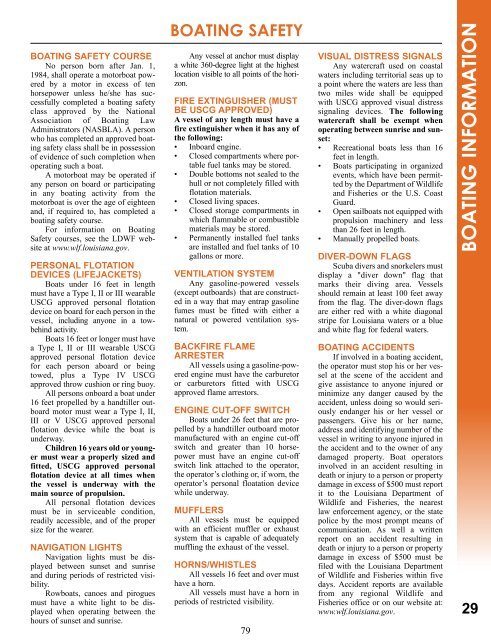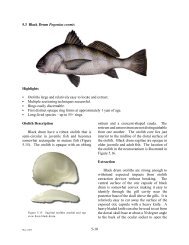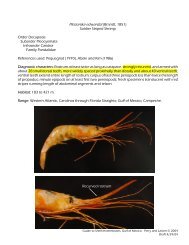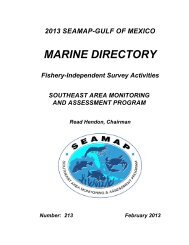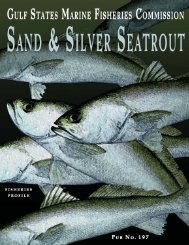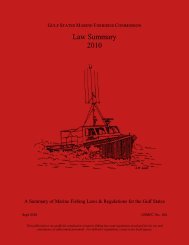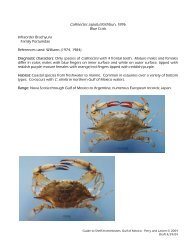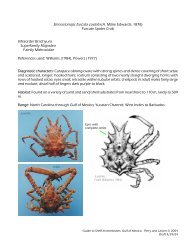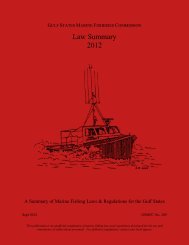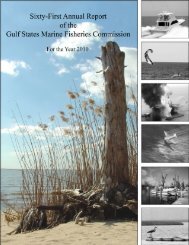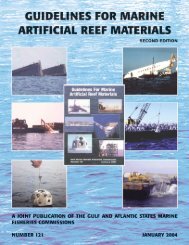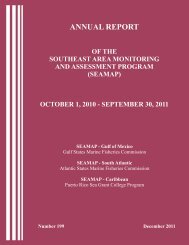Basic Commercial Fishing Regulations - Gulf States Marine ...
Basic Commercial Fishing Regulations - Gulf States Marine ...
Basic Commercial Fishing Regulations - Gulf States Marine ...
Create successful ePaper yourself
Turn your PDF publications into a flip-book with our unique Google optimized e-Paper software.
Boating Safety Course<br />
No person born after Jan. 1,<br />
1984, shall operate a motorboat powered<br />
by a motor in excess of ten<br />
horsepower unless he/she has successfully<br />
completed a boating safety<br />
class approved by the National<br />
Association of Boating Law<br />
Administrators (NASBLA). A person<br />
who has completed an approved boating<br />
safety class shall be in possession<br />
of evidence of such completion when<br />
operating such a boat.<br />
A motorboat may be operated if<br />
any person on board or participating<br />
in any boating activity from the<br />
motorboat is over the age of eighteen<br />
and, if required to, has completed a<br />
boating safety course.<br />
For information on Boating<br />
Safety courses, see the LDWF website<br />
at www.wlf.louisiana.gov.<br />
Personal Flotation<br />
Devices (Lifejackets)<br />
Boats under 16 feet in length<br />
must have a Type I, II or III wearable<br />
USCG approved personal flotation<br />
device on board for each person in the<br />
vessel, including anyone in a towbehind<br />
activity.<br />
Boats 16 feet or longer must have<br />
a Type I, II or III wearable USCG<br />
approved personal flotation device<br />
for each person aboard or being<br />
towed, plus a Type IV USCG<br />
approved throw cushion or ring buoy.<br />
All persons onboard a boat under<br />
16 feet propelled by a handtiller outboard<br />
motor must wear a Type I, II,<br />
III or V USCG approved personal<br />
flotation device while the boat is<br />
underway.<br />
Children 16 years old or younger<br />
must wear a properly sized and<br />
fitted, USCG approved personal<br />
flotation device at all times when<br />
the vessel is underway with the<br />
main source of propulsion.<br />
All personal flotation devices<br />
must be in serviceable condition,<br />
readily accessible, and of the proper<br />
size for the wearer.<br />
Navigation Lights<br />
Navigation lights must be displayed<br />
between sunset and sunrise<br />
and during periods of restricted visibility.<br />
Rowboats, canoes and pirogues<br />
must have a white light to be displayed<br />
when operating between the<br />
hours of sunset and sunrise.<br />
Boating Safety<br />
Any vessel at anchor must display<br />
a white 360-degree light at the highest<br />
location visible to all points of the horizon.<br />
Fire Extinguisher (Must<br />
be USCG approved)<br />
A vessel of any length must have a<br />
fire extinguisher when it has any of<br />
the following:<br />
• Inboard engine.<br />
• Closed compartments where portable<br />
fuel tanks may be stored.<br />
• Double bottoms not sealed to the<br />
hull or not completely filled with<br />
flotation materials.<br />
• Closed living spaces.<br />
• Closed storage compartments in<br />
which flammable or combustible<br />
materials may be stored.<br />
• Permanently installed fuel tanks<br />
are installed and fuel tanks of 10<br />
gallons or more.<br />
Ventilation System<br />
Any gasoline-powered vessels<br />
(except outboards) that are constructed<br />
in a way that may entrap gasoline<br />
fumes must be fitted with either a<br />
natural or powered ventilation system.<br />
Backfire Flame<br />
Arrester<br />
All vessels using a gasoline-powered<br />
engine must have the carburetor<br />
or carburetors fitted with USCG<br />
approved flame arrestors.<br />
Engine Cut-off Switch<br />
Boats under 26 feet that are propelled<br />
by a handtiller outboard motor<br />
manufactured with an engine cut-off<br />
switch and greater than 10 horsepower<br />
must have an engine cut-off<br />
switch link attached to the operator,<br />
the operator’s clothing or, if worn, the<br />
operator’s personal floatation device<br />
while underway.<br />
Mufflers<br />
All vessels must be equipped<br />
with an efficient muffler or exhaust<br />
system that is capable of adequately<br />
muffling the exhaust of the vessel.<br />
Horns/Whistles<br />
All vessels 16 feet and over must<br />
have a horn.<br />
All vessels must have a horn in<br />
periods of restricted visibility.<br />
79<br />
Visual Distress Signals<br />
Any watercraft used on coastal<br />
waters including territorial seas up to<br />
a point where the waters are less than<br />
two miles wide shall be equipped<br />
with USCG approved visual distress<br />
signaling devices. The following<br />
watercraft shall be exempt when<br />
operating between sunrise and sunset:<br />
• Recreational boats less than 16<br />
feet in length.<br />
• Boats participating in organized<br />
events, which have been permitted<br />
by the Department of Wildlife<br />
and Fisheries or the U.S. Coast<br />
Guard.<br />
• Open sailboats not equipped with<br />
propulsion machinery and less<br />
than 26 feet in length.<br />
• Manually propelled boats.<br />
Diver-Down Flags<br />
Scuba divers and snorkelers must<br />
display a "diver down" flag that<br />
marks their diving area. Vessels<br />
should remain at least 100 feet away<br />
from the flag. The diver-down flags<br />
are either red with a white diagonal<br />
stripe for Louisiana waters or a blue<br />
and white flag for federal waters.<br />
Boating Accidents<br />
If involved in a boating accident,<br />
the operator must stop his or her vessel<br />
at the scene of the accident and<br />
give assistance to anyone injured or<br />
minimize any danger caused by the<br />
accident, unless doing so would seriously<br />
endanger his or her vessel or<br />
passengers. Give his or her name,<br />
address and identifying number of the<br />
vessel in writing to anyone injured in<br />
the accident and to the owner of any<br />
damaged property. Boat operators<br />
involved in an accident resulting in<br />
death or injury to a person or property<br />
damage in excess of $500 must report<br />
it to the Louisiana Department of<br />
Wildlife and Fisheries, the nearest<br />
law enforcement agency, or the state<br />
police by the most prompt means of<br />
communication. As well a written<br />
report on an accident resulting in<br />
death or injury to a person or property<br />
damage in excess of $500 must be<br />
filed with the Louisiana Department<br />
of Wildlife and Fisheries within five<br />
days. Accident reports are available<br />
from any regional Wildlife and<br />
Fisheries office or on our website at:<br />
www.wlf.louisiana.gov.<br />
Boating Information<br />
29


